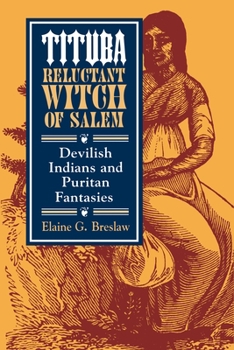Tituba, Reluctant Witch of Salem: Devilish Indians and Puritan Fantasies
(Part of the The American Social Experience Series Series)
Select Format
Select Condition 
Book Overview
A landmark contribution to women's history that sheds new light on the Salem witch trials and one of its most crucial participants, Tituba of The Crucible
Format:Hardcover
Language:English
ISBN:0814712274
ISBN13:9780814712276
Release Date:December 1995
Publisher:New York University Press
Length:270 Pages
Weight:1.01 lbs.
Dimensions:0.9" x 6.3" x 9.3"
Related Subjects
Americas Colonial Period Earth-Based Religions Folklore & Mythology History Modern (16th-21st Centuries) Mythology Mythology & Folk Tales Native American Occult Politics & Social Sciences Religion Religion & Spirituality Slavery & Emancipation Social Science Social Sciences Spirituality State & Local Textbooks Wicca Witchcraft Women in History WorldCustomer Reviews
3 ratings
New light shed on dark piece of American history
Published by Thriftbooks.com User , 15 years ago
Unlike most biographies of the time period, Elaine Breslaw does not simply elaborate on the life of a historically significant figure in Tituba: Reluctant Witch of Salem. In this biographical work Breslaw establishes a clear mission to shed light on the life of a vastly misunderstood individual by dismissing common misconceptions and elaborating on accepted fact. Despite the fact that there is a brevity of sound biography on Tituba, Breslaw succeeds in creating a most complete and convicining portrayal of Massachusettes most infamous 17th century witch. In the section one Breslaw highlights the cultural and national origins of Tituba, focusing primarily on her Arawak roots on the island of Barbados. Described by the author as an "Amerindian slave," Tituba's journey to the new world is laid in a precise and well documented manner through the employment of colonial records. Breslaw asserts her claims in the second chapter as she reasserts that there exists no other reference to any persons of the name Tituba in any colonial record. Next, the author claims that Tituba most likely arrived in Barbados via South America courtesy of the booming slave trading industry just prior to the time that Samuel Parris returned to America. The third chapter of the biography focuses on slave and plantation life in Barbados at the time of Samuel Parris' stay. Breslaw recalls that African-culture had permeated plantation life, supplying Tituba ample opportunity to observe traditional practices of witchcraft. The author however believed that no amount of time could have given the slave girl a strong enough grasp of the traditions she would be later accused of. The remainder of the biography focuses on Tituba in the context of 17th century Massachusetts. The beginning of the second section places the subject in the larger context of Amerindian slave life in New England. Chapter five highlights Puritan attitudes toward the sacrilegious practice of witchcraft and begins the narrative showing the sequence of events leading up to the pressured confession that secured Tituba's place in history. "Tituba's protective camouflage as a member of a Purtian household was stripped from her, exposing her as an Indian and demanding another means of resisting persecution." (97) The confessions of Tituba are the focus in the final chapters of the book as Breslaw examines how her testimonies were used against her and how they were perceived at the time by the local Puritan population. Elaine G. Breslaw spent her academic career as a professor of history at Morgan State University in Baltimore, Maryland. Following her retirement, Breslaw assumed the position of Visiting Professor of History at the University of Tennessee and also teaches part time at Johns Hopkins University School of Continuing Studies. Breslaw is the author of Dr. Alexander Hamilton and Provincial America: Expanding the Orbit of Scottish Culture, part of the Southern Biography
A worthwhile read
Published by Thriftbooks.com User , 16 years ago
An interesting, complex and scholarly analysis of Tituba's role in the Salem Witch Trials. Breslaw writes well but has a tendency to try to reinforce her points through repetition -- often at great length -- rather than the presentation of supporting information. She also sometimes presents speculation as fact, without sufficient documentation to support such an approach. Overall, however, the book is quite readable and informative. The appendices are extremely valuable, and the book would benefit from the addition of an appendix addressing the presentation of Tituba in literature, particularly as many readers will first come into contact with her via Arthur Miller's play The Crucible.
an *interesting* historical text
Published by Thriftbooks.com User , 22 years ago
This text retells the story we think we know about Tituba of Salem-- you know, the black slave woman who got all that trouble started with her voodoo-esque witchery... this book traces the historical evidence for Tituba actually being a Native American, and the path she would have taken to get to Salem at the time, as well as the story of what happened after she was swept up in the drama of the Puritans' search for the devil in the New World. It's a well-written historical account that is academic, but not so academic that those who are studying this period for fun will be alienated.






